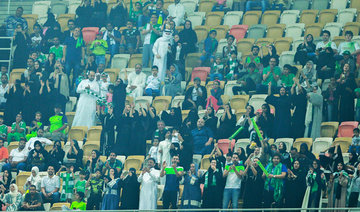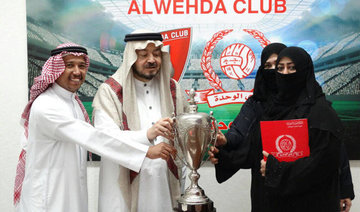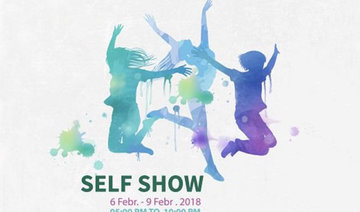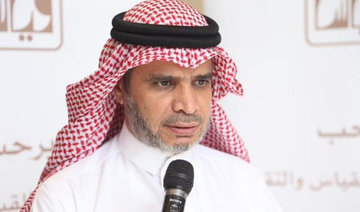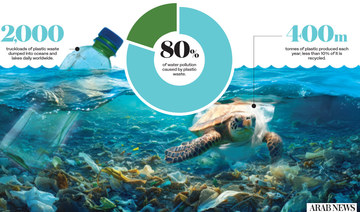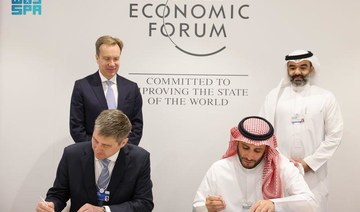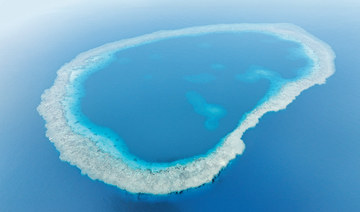JEDDAH: The focus was on women in sport at the eighth annual Universities Sports Tournament at Dar Al-Hekma University.
The university, a pioneering institution in the field of competitive sports for women, launched the all-female event in 2010 to encourage participation in sport and the adoption of a healthy lifestyle, serving the country’s vision 2030 project.
The tournament aims to promote healthy competition and forge relationships between the students from across the Kingdom, and to showcase the benefits of physical activity in building a physically and mentally fit generation who are able to better serve their communities
The sports included in this year’s two-day event, on February 27 and 28, were basketball, badminton, table tennis, running and soccer.
In addition to the hosts, all but one of the universities taking part are based in Jeddah: King AbdulAziz university, Effat University, University of Business and Technology, Batterjee Medical College, Ibn Sina National College for Medical Studies, and Jeddah University. They were joined by competitors from Princess Nourah bint Abdulrahman University (PNU) in Riyadh, the first time an institution outside of Jeddah has taken part.
“Sport is an integral part of student life,” said Dr. Sanaa Askool, Dar Al-Hekma’s dean of student affairs. It is really important to create a healthy community for students. Sport teaches you how to be a good leader and teaches you a lot about team spirit. It also it teaches you about loyalty to your team.”
Asmaa Al-Shareef, captain of the PNU basketball team, which finished in third place, said: “We would like to share our happiness of competing in this championship. We are so proud, and grateful to Dar Al-Hekma University as this tournament is our first outside of Riyadh. We are proud to represent Riyadh city.
“It is really pleasing to us to see how women’s sports are developing in Saudi Arabia according to vision 2030, bringing a lot of changes.”
Tahani Banajah, a freshman studying law at Dar Al-Hekma University, won the running race and finished third in the swimming.
“Since I started at Dar Al-Hekma I have experienced so many things,” she said.
Razan Al-Najjar, an architecture student and winner of the badminton contest, said: “My favorite sport is basketball I started to play seriously about a year and a half ago. This was my first time participating in a real competition, in badminton, surprisingly, and I won the third place. The game was really intense.”
The women’s sports sector in Saudi Arabia has been undergoing unprecedented restructuring and development recently, including the appointment of Saudi women to positions in sports, opening up to them entry to events in sports stadiums, and allowing them to take part in sports activities for the first time.
Dar Al-Hekma University is a private, non-profit institution of higher education for women in Jeddah. Classes are taught in English. The University opened in September 1999 with the approval of the Saudi Ministry of Education.
Women prove they are in a league of their own at Saudi Arabia’s Universities Sports Tournament
Women prove they are in a league of their own at Saudi Arabia’s Universities Sports Tournament
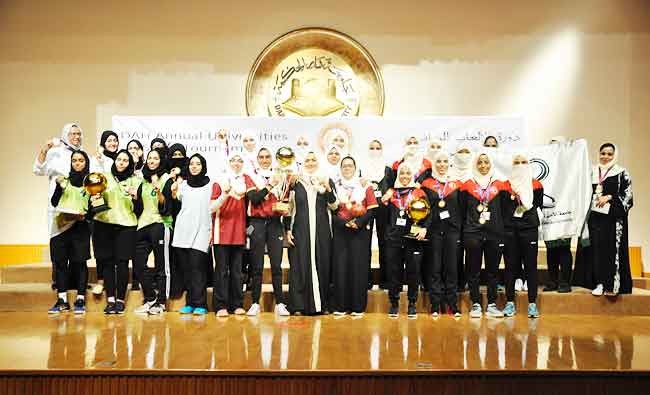
Arab League Educational, Cultural and Scientific Organization meetings begin in Jeddah

- Participants discuss challenges Arab nations face in fields of education, culture and science, and potential solutions, including knowledge sharing and innovation
- The 121st session of the organization’s Executive Council on Tuesday and Wednesday will be followed on Friday by its General Conference
JEDDAH: Ministers and other representatives from 22 Arab nations gathered in Jeddah on Tuesday for the start of the 121st session of the Executive Council of the Arab League Educational, Cultural and Scientific Organization. The two-day session concludes on Wednesday and will be followed on Friday by the organization’s General Conference.
During the meetings, hosted by the Saudi National Committee for Education, Culture and Science, the participants will discuss important topics, initiatives and proposals related to knowledge sharing, scientific advancement, and innovation within the framework of the work of the organization, the Saudi Press Agency reported.
During the opening session, Hani Al-Moqbel, chairperson of ALESCO’s Executive Council, expressed deep concern about the ongoing crisis Palestinians face as a result of the war in Gaza between Israel and Hamas.
He unequivocally condemned and rejected a senseless and brutal conflict that has claimed the lives of countless civilians, including women, children and the elderly, and denounced as unacceptable the destruction by the Israeli military campaign of hospitals, religious sites, schools, cultural institutions and other infrastructure.
The council, led by its Saudi presidency, expressed its strong condemnation of the continued aggression, occupation and forced displacement in Gaza. Al-Moqbel said that such expressions are not merely procedural or symbolic, they represent a forward-thinking approach to fostering Arab unity, upholding core principles and bolstering shared values. In this way, he added, Arab nations can effectively tackle challenges and overcome hurdles on their paths to advancement.
Mohammed Walad Amar, the director general of ALECSO, highlighted the organization’s commitment to the promotion of the cultural heritage of Arab countries on the global stage. In keeping with this vision, he said, ALECSO has worked with several countries with the aim of securing recognition of more of their cultural treasures on the highly esteemed UNESCO World Heritage List.
As an example of its active engagement in these efforts, he noted that ALECSO took part in the UNESCO Culture and Education Ministers’ Conference in the UAE in February.
Other topics discussed on the opening day included challenges that Arab nations face in the fields of education, culture and science, innovative potential solutions to the problems, and ways to forge new partnerships that can broaden the horizons of education and thinking.
NCWD launches project to evaluate marine species in Arabian Gulf

- Goal behind project is to build baseline for developing integrated management plan for marine environments
- NCWD CEO said project aims to provide basic assessment of the condition of coral reefs
RIYADH: The National Center for Wildlife Development launched on Tuesday a project that aims to assess the state of marine habitats in the Arabian Gulf’s Saudi waters, the Saudi Press Agency reported.
The NCWD said the goal behind the project was to build a baseline for developing an integrated management plan for marine environments, preserving biodiversity and reducing threats.
It will also enhance the sustainability of marine environments in Saudi waters in light of their economic, social and cultural value and their provision of many valuable ecosystem services.
Mohammed Ali Qurban, NCWD’s CEO, said the project aimed to provide a basic assessment of the condition of coral reefs, seagrass meadows, mangrove forests, and associated animals and marine species.
The project will identify natural risks associated with human activities that threaten these coastal ecosystems, and concurrently, find solutions to reduce those threats.
It will also design an effective plan to preserve and rehabilitate these coastal habitats, based on the data provided by the project.
Qurban said Saudi waters in the Gulf cover an area exceeding 27,000 square kilometers and contain very important marine habitats, which support a wide range of marine species.
NCWD’s CEO pointed out that marine systems are exposed to many pressures and require continuous monitoring and the application of an effective plan to preserve and manage them in a sustainable manner.
The data provided by the project constitute an essential factor for conservation and rehabilitation measures and enabling NCWD and other relevant parties to build a management plan to sustain these valuable habitats.
Prince Sultan University hosts panel on space exploration

- Kingdom has already achieved a high-calibre position in space industry, says NASA’s Bill Nelson
RIYADH: Delegations from NASA and the Saudi Space Agency visited Prince Sultan University on Tuesday to engage with students on the future of human missions in space.
A panel session titled “Beyond Earth: Journeys to the Stars,” brought together NASA administrator Bill Nelson and Saudi astronauts Rayannah Barnawi, Ali Al-Ghamdi and Mariam Fardous, to discuss their own experiences in space.
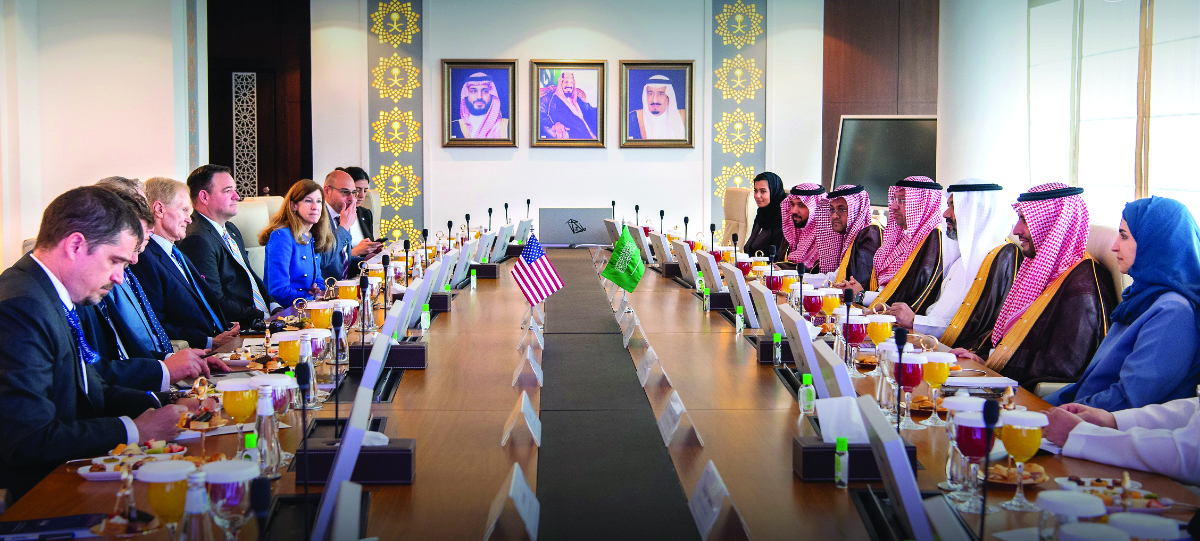
They also debated the future of human missions in space and encouraged the university’s students to be part of the Kingdom’s aspirations in the space field.
Mohammed Al-Tamimi, CEO of Saudi Space Agency, and Ambassador of the US to the Kingdom Michael Ratney, were also present at the reception.
HIGHLIGHTS
• The panel discussion hosted at Prince Sultan University debated the future of human missions in space.
• During his visit to the Kingdom, Bill Nelson also met Munir Eldesouki, president of King Abdulaziz City for Science and Technology.
In an interview with Arab News, Nelson highlighted the importance of space missions. “When we go into space, we have to invent and create new things and that helps us advance our standard of living here on the earth,” he said.
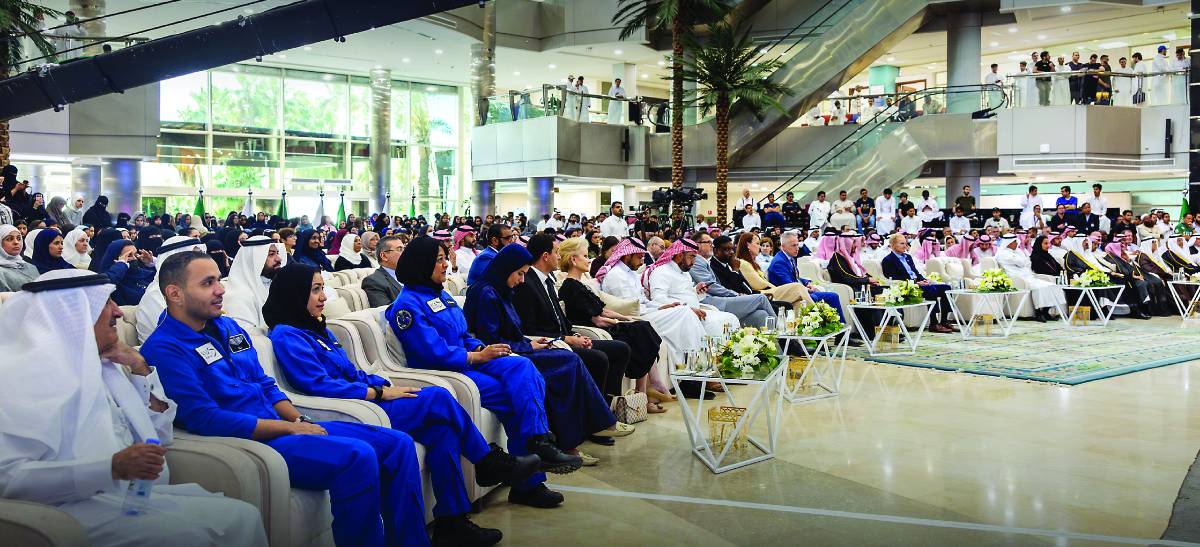
“One of the good examples that I gave in the speech today is the camera in your cell phone, that was developed by NASA. It’s a camera on a chip … there are so many technological outgrowths and spinoffs from our developing space technology.”
Nelson said that there would be further developments in the near future in pharmaceutical research and zero gravity on the International Space Station.
When we go into space, we have to invent and create new things and that helps us advance our standard of living here on the earth.
Bill Nelson, NASA administrator
“There are going to be some major breakthroughs, and already have been on developing drugs, for the cure of diseases. So, there’s a lot of excitement in the future,” he said.
Saudi Arabia has already achieved a high-calibre position in the space industry, he said.
Ahmed Yamani, president of Prince Sultan University, said that it had established a new college of space and aviation with the cooperation with the Saudi Space Agency and Al-Tamimi.
“We went through the process of the initiating this college, which is really based on what we already have … we have a program, aviation management, that was established with Embry-Riddle Aeronautical University in Florida.”
Yamani said that the university was already building the foundation of the space and aviation program with “external consultants that are working with us on both department and both programs. So, we want to definitely touch on the latest and the update updated programs in these areas.”
During his visit to the Kingdom, Nelson also met Munir Eldesouki, president of King Abdulaziz City for Science and Technology, and discussed ways to deepen cooperation in the space sector.
Chairman of the Saudi Space Agency Abdullah Al-Swaha held talks with Nelson in the presence of Al-Tamimi, and they discussed strategic partnership in the field of space to serve humanity.
The Saudi Space Agency is responsible for developing and growing its space sector with a focus on supporting economic growth, stimulating innovation and scientific research.
Saudi Arabia takes part in Netherlands Geospatial World Forum as strategic partner

- The authority is collaborating with the World Bank to conduct studies on the economic impact of geospatial information in Saudi Arabia
RIYADH: Saudi Arabia’s General Authority for Survey and Geospatial Information is serving as a strategic partner in the Geospatial World Forum, a global event with more than 300 speakers specializing in geospatial information.
Themed “Geospatial Transition: Powering the World Economy,” the four-day forum is taking place in Rotterdam, the Netherlands, until May 16.
GEOSA represents the Kingdom at home and abroad in the geospatial sector.

The Rotterdam forum provides a platform to exchange knowledge and unveil smart solutions provided by geospatial information, and includes more than 55 pavilions showcasing the latest technology in the sector.
During the opening session, Mohammed Al-Sayel, president of the authority, said in a speech that geospatial information is playing an important role in decision-making within the rapidly growing Saudi economy.
FASTFACT
Geospatial World Forum held in Rotterdam provides a platform to exchange knowledge and unveil smart solutions provided by geospatial information.
The authority is collaborating with the World Bank to conduct studies on the economic impact of geospatial information in the Kingdom, he added, highlighting work with international organizations concerned with geospatial information management specifications, standards and governance.

Al-Sayel said that the Kingdom, represented by GEOSA, has contributed to the development of geospatial information management globally by hosting the UN Global Geospatial Ecosystem Center of Excellence in Riyadh. The center allows experts to exchange expertise and knowledge within the geospatial information management sphere.
The Kingdom has built and maintained national geospatial infrastructure according to the best international practices, he added, in addition to working on developing national capabilities in the sector.
During a session titled “Geospatial Transition Driving Economic Value in Various Sectors,” GEOSA spokesperson Fatma Al-Shammari said that the Kingdom is undergoing a “significant transition” in various developmental fields, with major projects benefiting from advanced geospatial technologies to achieve national targets.
On the sidelines of the forum, the Kingdom, represented by GEOSA, took part in an accompanying exhibition with its main pavilion as a strategic partner, showcasing Saudi Arabia’s national geospatial infrastructure to visitors and introducing the most prominent development projects in the country.
The exhibition covered hydrographic surveying, national geodetic infrastructure and map production.
Exercise to deal with environmental emergencies starts in Tabuk region
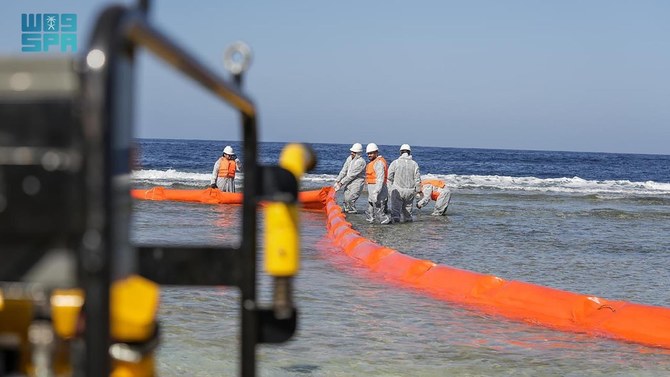
- Exercise is being supervised by the National Center for Environmental Compliance and is taking place in cooperation with 39 governmental and private agencies
RIYADH: An exercise aimed at raising readiness to confront environmental emergencies or oil spill incidents kicked off on the Tabuk coast on Tuesday.
The two-day exercise, called “Response 14,” is part of the Kingdom’s plan to combat pollution of the marine environment with oil and other harmful substances, Saudi Press Agency reported.
The exercise is being supervised by the National Center for Environmental Compliance and is taking place in cooperation with 39 governmental and private agencies.
The center’s official spokesman, Saad Al-Matrafi, revealed that the readiness of each participating agency increased every time such an exercise was held.
He added that there was a noticeable development in the technology being used by the various participating agencies as well as the skills of their employees, as a result of such exercises.
He explained that the exercise is being carried out in several stages in which satellites and advanced simulation programs are used.
Participants will learn how to deal with simulated scenarios of pollution spreading in the middle of territorial waters and its impact extending to coasts and marine habitats.
They will also learn how to contain this pollution and reduce its negative effects on the marine environment and the region’s economy.
Al-Matrafi said the national plan to combat oil spills and harmful substances has succeeded in testing its ability to contain a spill of 75,000 barrels, with a high response rate not exceeding 50 minutes, through the largest fleet of naval units designated for this purpose, in addition to specialist aircraft.














